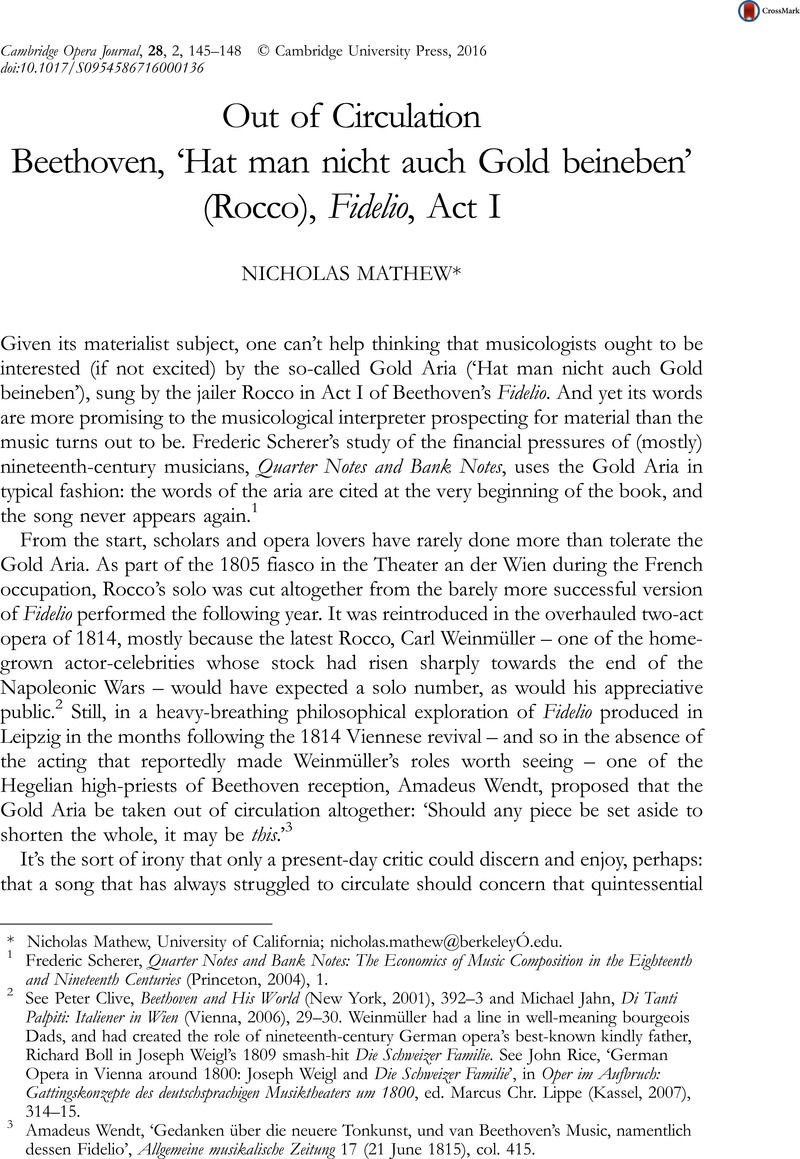Article contents
Out of Circulation Beethoven, ‘Hat man nicht auch Gold beineben’ (Rocco), Fidelio, Act I
Published online by Cambridge University Press: 28 September 2016
Abstract

- Type
- Research Article
- Information
- Cambridge Opera Journal , Volume 28 , Special Issue 2: Special Issue: Remaking the Aria , July 2016 , pp. 145 - 148
- Copyright
- © Cambridge University Press 2016
Footnotes
Nicholas Mathew, University of California; nicholas.mathew@berkeleyÓ.edu.
References
1 Scherer, Frederic, Quarter Notes and Bank Notes: The Economics of Music Composition in the Eighteenth and Nineteenth Centuries (Princeton, 2004), 1 Google Scholar.
2 See Clive, Peter, Beethoven and His World (New York, 2001), 392–393 Google Scholar and Jahn, Michael, Di Tanti Palpiti: Italiener in Wien (Vienna, 2006), 29–30 Google Scholar. Weinmüller had a line in well-meaning bourgeois Dads, and had created the role of nineteenth-century German opera’s best-known kindly father, Richard Boll in Joseph Weigl’s 1809 smash-hit Die Schweizer Familie. See Rice, John, ‘German Opera in Vienna around 1800: Joseph Weigl and Die Schweizer Familie ’, in Oper im Aufbruch: Gattingskonzepte des deutschsprachigen Musiktheaters um 1800, ed. Marcus Chr. Lippe (Kassel, 2007), 314–315 Google Scholar.
3 Wendt, Amadeus, ‘Gedanken über die neuere Tonkunst, und van Beethoven’s Music, namentlich dessen Fidelio’, Allgemeine musikalische Zeitung 17 (21 June 1815)Google Scholar, col. 415.
4 Wendt, ‘Gedanken’ (14 June 1815), col. 400.
5 Wendt, ‘Gedanken’ (21 June 1815), col. 415.
6 Robinson, Paul, Ludwig van Beethoven: Fidelio (Cambridge, 1996), 10 Google Scholar, 83.
7 Robinson, Fidelio, 82.
8 For a nifty account of the confusions and tensions in historians’ use of the word ‘bourgeois’ see Williams, Raymond, Keywords: A Vocabulary of Culture and Society, rev. edn (London, 1988), 45–48 Google Scholar. See also Carl Dahlhaus’s perceptive and resonant analysis of the Viennese Beethoven monument as an uneasy compromise between aristocratic monumentality and ‘bourgeois ideals’ – a compromise that has an analogue, he claims, in the Beethoven myth itself; Nineteenth-Century Music, trans. J. Bradford Robinson (Berkeley, 1989), 79.
9 See Solomon, Maynard, ‘The Nobility Pretense’, in Beethoven Essays (Cambridge, MA, 1988), 53 Google Scholar.
10 See Solomon, ‘Beethoven’s Magazin der Kunst’, in Beethoven Essays, 193–204.
- 1
- Cited by


